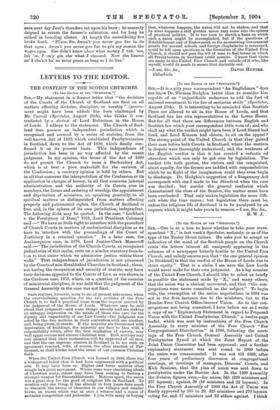LETTERS TO THE EDITOR.
THE CONFLICT IN THE SCOTCH CHURCHES.
I To THE EDITOR OF THE "SPECTATOR."
Siit,—My statement in a former letter that "the decisions of the Courts of the Church of Scotland are final on all
matters affecting doctrine, discipline, or worship" (govern- ment might have been added) has been challenged by Mr. Carroll (Spectator, August 20th), who thinks it con- tradicted by a dictum of Lord Robertson in the House of Lords. I adhere to the statement. The Church of Scot- land does possess an independent jurisdiction which is recognised and secured by a series of statutes, from the well-known Act of 1592, which established Presbyterianism in Scotland, down to the Act of 1690, which finally con- firmed it on its present basis. This independence of jurisdiction has been in no way affected by the recent judgment. In my opinion, the terms of the Act of 1690 do not permit the Church to issue a Declaratory Act, which is at best a poor makeshift for the revision of the Confession ; a contrary opinion is held by others. But in all that concerns the interpretation of the Confession or its application in charges of heresy, in all that concerns internal administration and the authority of its Courts over its
members, the forms and ordering of worship, the appointment and deprivation of ministers, or, speaking generally, in all spiritual matters as distinguished from matters affecting property and patrimonial rights, the Church of Scotland is free, and, in the sphere of its own jurisdiction, independent. The following dicta may be quoted. In the case, "Lockhart v. the Presbytery of Deer," 1851, Lord President Colonsay said :—" We have as little right to interfere with the procedure of Church Courts in matters of ecclesiastical discipline as we have to interfere with the proceedings of the Court of Justiciary in a criminal question." In a later case, the Auchtergaven case, in 1870, Lord Justice-Clerk Moncrieff said :—" The jurisdiction of the Church Courts, as recognised judicatories of this realm, rests on a similar statutory founda- tion to that under which we administer justice within these walls." That independence of jurisdiction is not possessed by the Courts of non-Established Churches in Scotland ; these, not having the recognition and security of statute, may have their decisions appealed to the Courts of Law, as was shown in the Cardross case, 1859, where, on a question of the exercise of ministerial discipline, it was held that the judgment of the General Assembly in the case was not final.
Such matters, however, seem to me at present side-issues, when the overwhelming question for the two sections of the Free Church is to find a practical issue from the impasse created by the judgment of the House of Lords. Whatever may be said about that judgment—and some things already said are making an unhappy impression on the minds of those who care for the dignity and impartiality of our Law Courts—the judgment was asked by the two sections in their contention with one another, and, being given, it stands. If the majority are threatened with deprivation of buildings, the minority are face to face with a responsibility which, after the first exultation of victory, may well appal serious and sincere Christian men. Both sections may rest assured that their moderation will be approved of all men, and that the one supreme concern in Scotland is to see such an agreement reached, with, of course, the after sanction of Par- liament, as shall hinder least the cause of our common Christian faith.
. When the United Free Church was formed in 1900, there was a widespread belief that it had been engineered with a political aim. It may have been so. Higher and lower motives often mingle in a great movement. Where some were cherishing ideals of Christian unity, others may have been seeking to fashion a stronger weapon for Disestablishment. Motives apart, the union was a great step for the good of religious life in Scotland. To mention only one thing, it has already in four years done much to diminish the excess of churches in our villages and smaller towns, an excess which was at once a witness and a cause of sectarian competition and jealousies. I join with many in hoping that, whatever happens, the union will not be shaken, and that by what happens a still greater union may come into the sphere of practical politics. It is too soon to sketch a basis on which such a union might be accomplished, but if the questions of Establishment and of Endowment, so far as receiving Government grants for normal schools and foreign chaplaincies is concerned, could be left open questions in the formation of the United Free Church, it should not pass the wit of man to find terms on which all Presbyterians in Scotland could reunite. I know that there are many in the United Free Church and outside of it who, like myself, would do much to secure that desirable end.






































 Previous page
Previous page